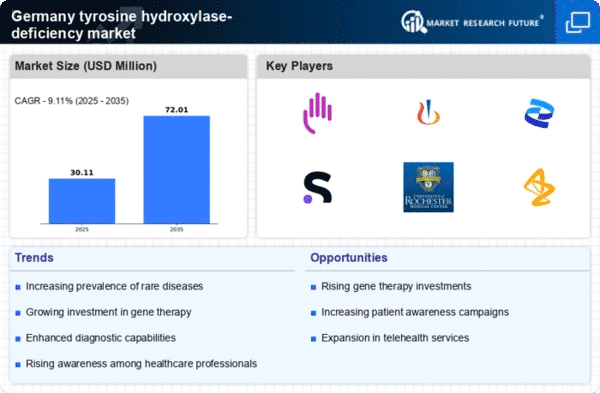The Germany Tyrosine Hydroxylase Deficiency Market is characterized by dynamic competition and evolving strategies among key players in the pharmaceutical sector. As the prevalence of this rare genetic disorder continues to gain attention, companies operating in this space are focused on developing innovative therapies and treatment options tailored to meet the specific needs of patients. Ongoing research and advancements in gene therapy and enzyme replacement therapy are driving the market, alongside increasing awareness and diagnostic capabilities that facilitate early detection of tyrosine hydroxylase deficiency.
The competitive landscape is shaped not only by the introduction of new products but also by collaborations, partnerships, and strategic alliances aimed at maximizing market reach and addressing unmet medical needs.
Takeda Pharmaceutical enjoys a notable presence in the Germany Tyrosine Hydroxylase Deficiency Market, leveraging its established reputation as a leader in the rare disease segment. The company's strengths lie in its commitment to research and development, which enables it to offer cutting-edge therapeutic solutions. Takeda's focus on patient-centric initiatives has allowed it to build strong relationships within the healthcare community, enhancing its visibility and engagement with healthcare professionals and patients alike.
Additionally, Takeda's efforts to provide comprehensive support services to patients and stakeholders contribute to its competitive advantage, as it aims to improve treatment outcomes and quality of life for those affected by this rare condition.
Novartis similarly plays a significant role in the Germany Tyrosine Hydroxylase Deficiency Market, underlining its dedication to addressing unmet medical needs through progressive therapies. The company is known for its key products designed to manage the symptoms associated with this deficiency, which further solidifies its position in the market. Novartis's strengths in Germany are underscored by its robust research capabilities and a strong pipeline of innovative solutions addressing neurological disorders. Strategic mergers and acquisitions have enabled Novartis to enhance its market presence and broaden its portfolio, allowing for synergistic growth opportunities.
By focusing on collaborations that foster innovation and accessibility, Novartis continues to assert itself as a key player, dedicated to advancing treatment options for patients suffering from tyrosine hydroxylase deficiency.














